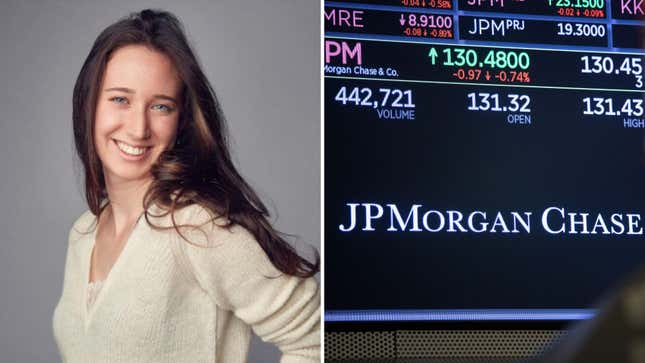Charlie Javice Joins List of Forbes ’30 Under 30′ Alumni Who’ve (Allegedly) Committed Fraud
JP Morgan, which acquired student aid company Frank, says Javice created millions of fake users to bolster her company's value.
EntertainmentEntertainment

Most people, when hearing someone was someone was pitching “Amazon for higher education,” would stare blankly in response, and perhaps mutter “wut.” But not mega-bank JP Morgan! When its execs learned that Charlie Javice, founder of the financial aid startup Frank, planned to create an “Amazon for higher education,” they eagerly handed over $175 million dollars. But it turns out they should’ve gone the “wut” route…because they’re now suing Javice for fraud.
Javice, a 2019 recipient of the highest honor a twenty-something can hope for (a spot on the Forbes “30 Under 30″ list), appears set to join the illustrious ranks of young founders who got in a bit over their heads and woke up one day a scammer (your Elizabeth Holmeses, your Sam Bankman-Frieds).
JP Morgan claims that her company, Frank, which supposedly guided college applicants through the FAFSA application process, “invented several million Frank customer accounts out of whole cloth,” Forbes reported late Wednesday. “In every aspect of her interactions with JPMC, Javice had a choice between revealing the truth about her startup and accepting Frank’s actual value and lying to inflate Frank’s value,” the lawsuit says. “Javice chose each time to lie, and the evidence shows that time and again she layered fraud upon fraud to deceive JPMC.” Damn.
In July 2021, as part of its due diligence process before purchasing the company, JP Morgan asked for Frank’s user roster. Javice pushed back, saying that sharing it would be an invasion of privacy. Behind the scenes, she and Frank’s chief growth officer, Olivier Amar, asked the company’s director of engineering to create fake accounts to bolster their numbers. That guy, smartly, asked if that was even legal.
-

-

-

-

-

-

-

-

-

-

-

-

-

-

-

-

-

-

-

-

-

-

-

-

-

-

-

-

-

-

-

-

-

-

-

-

-

-

-

-








































